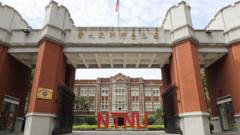As Taiwan prepares for a historic recall vote targeting pro-China lawmakers, tensions escalate in a polarized political environment. This unprecedented event may reshape power dynamics in Taiwan while deepening divisions among supporters of the ruling Democratic Progressive Party and the opposition Kuomintang.
Taiwan's Great Recall Vote: A Battle for Democracy or Division?

Taiwan's Great Recall Vote: A Battle for Democracy or Division?
Taiwan is set for a controversial vote aimed at ousting lawmakers perceived as pro-China, revealing deep political cleavages amid rising tensions with Beijing.
Deng Pu never envisioned himself as an activist until late last year when frustration over what he viewed as undemocratic behavior among Taiwan's lawmakers motivated him to join a massive protest movement. Angered by perceived Chinese influence in the legislative process, Deng and others took a stand for democracy, culminating in a monumental vote taking place on Saturday. Known as "dabamian," or the Great Recall, this unprecedented referendum could lead to the ousting of over two dozen legislators accused of strong ties to Beijing.
The backdrop to this contentious vote includes last January's elections, where voters elected William Lai from the ruling Democratic Progressive Party (DPP) as president, yet gave significant power to the opposition Kuomintang (KMT) in the Legislative Yuan. This dynamic has resulted in political gridlock, as KMT lawmakers blocked DPP initiatives and advanced controversial legislation that prompted public outrage among many Taiwanese citizens.
The Bluebird movement emerged in response, mobilizing thousands to protest what they see as the KMT’s alignment with Beijing's interests. Tensions escalated with allegations that KMT legislators were pushing a Chinese agenda and, amid accusations, various civic groups initiated petitions for recall votes against several KMT lawmakers. In a retaliatory move, KMT supporters also launched petitions targeting some DPP legislators. This reciprocal political clash reflects fears that if some KMT lawmakers are removed, the DPP could tilt the legislative balance in its favor.
As the recall approach, Taiwanese voters in 24 districts will make a straightforward decision: whether to remove their sitting legislator. For a recall to be successful, a threshold of 25% voter turnout with over half in favor is required. Civic groups involved in the Bluebird movement have gone to great lengths to ensure a robust turnout, canvassing neighborhoods and using social media to drum up support.
Deng Pu emphasized the importance of the recall, framing it as a necessary corrective measure in Taiwan's democracy. While he acknowledged that the movement may be perceived as beneficial to the DPP, he firmly stated that the goal was to ensure a parliament free from undue Chinese influence.
The DPP initially detached itself from the Great Recall, but later publicly expressed support, which sparked skepticism from opposition parties who accused them of orchestrating the movement for their political gain. Detractors of the recall have organized counter-protests, framing the campaign as a threat to democracy and accusing the DPP of undermining electoral processes.
As the vote draws near, the debate continues to intensify, with significant implications for Taiwan's political landscape, including potential shifts in alliances and power dynamics. Compounding the already unyielding divisions within society, analysts predict that the outcome of this vote will have lasting consequences, cementing the notion of political accountability while potentially worsening polarization.
With the implications of the Great Recall still unfolding, it remains to be seen whether it will invigorate political activism and civic engagement or merely inflame existing rifts within Taiwanese society.


















